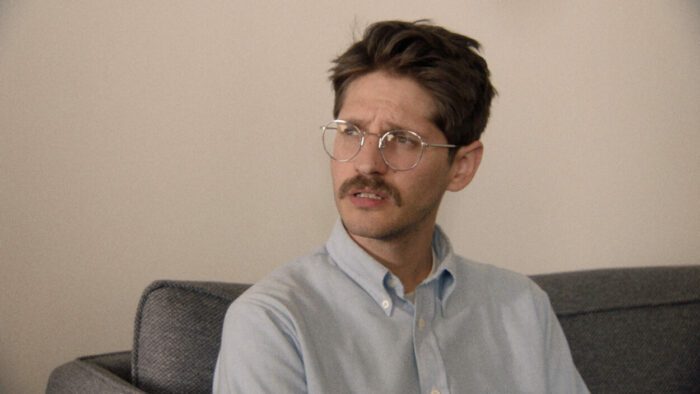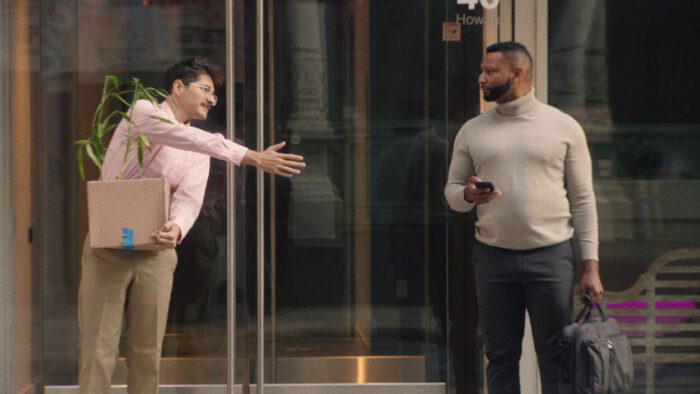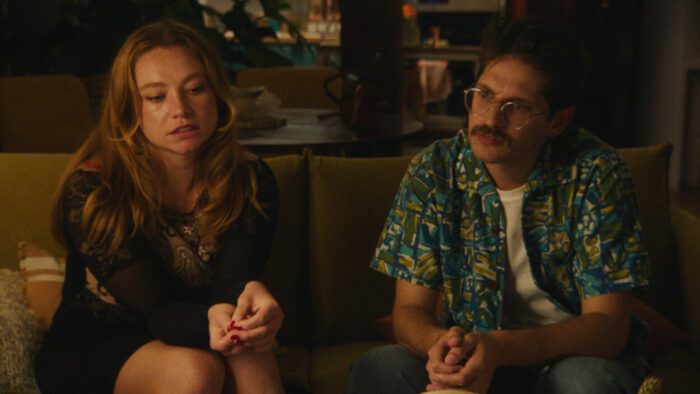For better or worse, Free Time operates like an audience tolerance test on the topic of the Millennial lifestyle. Little events and narrative turns occur that viewers will either identify with to a certain degree or downright disdain. The examinee for this inquest is Drew, played by emerging writer/actor Drew Burgess (who also headlines the indie Dad & Step-Dad this month), and the first exercise of this filmic inquest occurs in the opening five minutes of Free Time.
Drew walks into his boss Luke’s (James Webb, in his feature debut) office and admits to being unengaged with his data analysis work. He remarks that he thought there would be more interaction with people and less data entry. The extremely understanding Luke takes all this in with an even keel and proposes a transfer to a different position as an assistant in the HR department for a small reduction in pay. That’s when the young man in his mustache and spectacles takes the patience and good will offered before him and pisses it away.

When asked by Luke to share how he feels, Drew rebuffs the suggested dock in pay, not realizing that’s precisely what happens when one asks for less work. He begins a minor diatribe on the thesis of “But it’s my 20s…” and how he should be living life unconfined by a 9-to-5 job. Upon finishing his unrefined monologue, he hurdles right over any suggested sleep-on-it thinking time and impulsively puts in his two weeks on the spot.
When that meeting ends, Free Time cuts to what is Drew’s last day of work after those two weeks. Any hope that he reflected further or was talked out of his decision clearly didn’t happen when the observant camera positioned across the street shows Drew walking out of the building with his box of desk belongings at the same time as Luke. When Drew notices his now-former boss, he smiles, says something to the effect of “I don’t want to leave on bad terms,” and offers a handshake.

To watch Luke momentarily divert his focus from his smartphone to look down at the extended hand and then back up to Drew’s face before silently turning and leaving in refusal shows a few things. First, one can tell these unseen two weeks likely weren’t the most productive or cordial in the office. Secondly, this entire gesture from Drew is taken as clueless gall. This concludes the first piece of this Millennial test in Free Time. At this first checkpoint backed by a gentle piano score from first-time movie composer Mason Margut, if you’re rooting for the guy to stick it to the corporate world and strike out on his own, that meshing optimism says one thing. If you’re quickly calling him your preferred term for an idiot, that’s another.
Either way, from this self-liberation– which begins in sad sack fashion with a bit of physical comedy from Burgess fumbling with a non-working subway fare card while clutching that silly box next to a singing busker duo– the idealists will be plotting out his forthcoming happiness. Meanwhile, the cynics will be searching for redeemable qualities to not completely dismiss this character.
When Drew arrives home to break the news to his roommate Rajat (What We Do in the Shadows TV writer Rajat Suresh), the eyebrow raising reactions begin. The antsy Drew begins breaking his routines by tempting himself to try a different cafe breakfast item, watching some overdue movies, and going out for a bike ride. It takes a single whole day on his own to realize an income is actually necessary. Over and above that, it takes Drew one careless night out in Greenwich Village with bar drinks and edibles to financially cripple himself. Do those realizations spur Drew to get another job? Nope. He stays his course of pissing and moaning about capitalism with no concrete plans of any kind.

In this middle section of the film, Free Time poses this lesson’s question of the new layabout for the Millennial tolerance test. Through more of that observant camera work of wide and medium shots by cinematographer Victor Ingles (Macy Ray and the Legend of Dead River), we watch the invisible clouds of emotional fragility and social awkwardness all around Drew on his own and around others. It doesn’t take a psychology degree or even a Magic 8-Ball to call the attitude out. Pick your synonym poison between privilege, prerogative, immunity, entitlement, etc.
Casting your own permissive patience aside, Free Time is set up to be a stellar acting showcase for Drew Burgess. The point-of-view never leaves his skittish space. Drew does all the little things with his body language and speech inflection to craft an unlikable, yet wholly unique character that is not an overloaded collection of amplified nerd and loser tropes. By the end of Free Time, we want to shake him to get his conduct together and learn an attainable work-life balance. To provoke that response and generate that antipathy is evidence of Burgess’s undeniable screen presence. With his slight frame and the Big Apple habitat in play, the echoes of Woody Allen are inescapable.

Much of Free Time descends into Drew’s wallowing path that is only mildly interesting. There’s a moment where Drew strikes out with a beautiful, flirty woman (Princess Cyd’s Jessie Pinnick) he meets outside a party. Later, he’s waffling as a keyboardist in his old band and struggling to come to grips with the lead singer (Michael Patrick Nicholson of Nobody’s Watching) hiring a manager and drastically changing musical genres. The failures and lack of blame acceptance pile up. There’s a line Drew drops at a band session when he laments “I feel like I contributed nothing to today.” Gosh, you don’t say?!
Drew and Free Time ultimately unravel because he doesn’t have a leg to stand on, so the script from short film director-writer-editor Ryan Martin Brown has to manufacture a few for sympathy’s sake. Right when the selfish pity party to feel consequential gets exhausting, Free Time takes a hard right turn in the third act when Drew’s stance of defiance turns into grandiose enough action other people notice. His rants about preserving time and youth become inspiring to fellow twenty-something men in their own ruts where dozens join his cause of freedom. If this daring idea was more of the movie, it would finally have a unique and incisive commentary on the plight of this generation. That momentum is too little and too late.




